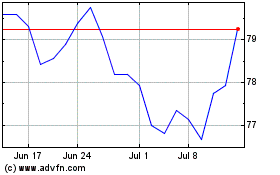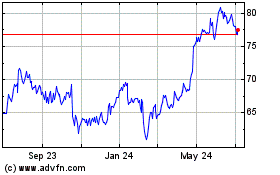AstraZeneca's Covid-19 Vaccine Shortfall Threatens EU Plans to Boost Inoculations
January 23 2021 - 1:04PM
Dow Jones News
By Jenny Strasburg and Laurence Norman
AstraZeneca PLC expects to deliver tens of millions fewer
Covid-19 vaccine doses than planned to the European Union in coming
months, according to people familiar with the matter, threatening
the continent's plans to ramp up vaccinations and delivering a
fresh reputational blow to the drugmaker.
AstraZeneca disclosed the shortfall late Friday after briefing
European officials earlier in the day. It blamed a manufacturing
issue in Europe, but didn't disclose the magnitude of the
shortfall.
According to people familiar with the matter, the company told
European officials that in a worst-case scenario, AstraZeneca may
be able to provide only around 30 million of roughly 80 million
doses EU countries had anticipated for February and March, a
roughly 60% decline from the company's earlier estimates.
AstraZeneca is working to significantly reduce that potential
shortfall and says the roughly 30 million doses is the minimum it
should be able to deliver, these people said.
The root cause of the problem is a manufacturing facility in
Belgium owned by Novasep Holding SAS that has been unable to make
as much bulk vaccine as projected, the people said. The facility's
so-called yield, or the amount of vaccine it can make from base
ingredients, is running at about a third of AstraZeneca's
expectations, one of the people said. Novasep didn't respond to
requests for comment Saturday.
Vaccine yields can vary widely depending on "seeding" steps,
taken over weeks, to grow cells needed to make the vaccine and
later-stage processes to filter and purify the substance before
it's packed into vials. AstraZeneca has found yields varying among
its many manufacturing partners and has been working to boost
production where it is lagging, the person said. The process is
labor- and time-intensive. Reuters first reported the number of
doses AstraZeneca may no longer be able to deliver.
The size of the expected shortfall has raised alarms in European
capitals, which are racing to accelerate vaccination drives that
have fallen behind other Western countries, including the U.K. and
U.S. The bad news came after European officials clashed this week
with Pfizer Inc. and BioNTech SE over the companies' decision to
cut their own planned deliveries of Covid-19 vaccines to the
bloc.
It also demonstrates the delicate supply lines that vaccine
producers rely on to push out the hundreds of millions of vaccine
doses they have promised to deliver. AstraZeneca partnered with the
University of Oxford to get its vaccine candidate to market.
AstraZeneca has agreed to make 3 billion doses of the vaccine this
year and not profit from it during the pandemic -- or ever in the
case of poorer countries.
The ambitious volume target and no-profit promise set
AstraZeneca apart from other big pharmaceutical companies rolling
out vaccines, but it also brings massive logistical challenges and
reputational risks. The company, which has relatively little
experience in vaccines, is relying on its own manufacturing
facilities and those of contractors and other partners around the
world.
Complicating the massive distribution effort: different drug
approval procedures AstraZeneca has had to navigate to get its
vaccine authorized for use. The company, alongside Oxford,
initially stumbled in efforts to communicate results of the shot's
late-stage human trials, sowing confusion about the vaccine's
effectiveness.
The U.K. approved it for emergency use in late December, and
others, including India, have followed suit. The Food and Drug
Administration, however, is waiting for full U.S. trial data before
reviewing it for authorization, data expected as soon as February.
The European Medicines Agency, which approves new drugs for the
bloc, will consider it next week.
The U.K. had a head start with AstraZeneca, agreeing to buy
hundreds of millions of doses earlier than Europe and working
closely with the drugmaker to set up a U.K. supply chain to begin
churning out those vaccines. European agreements and manufacturing
arrangements took longer to pull together, according to people
familiar with the process. What's more, the U.K. authorized the
AstraZeneca vaccine before any other Western countries -- and
almost a month before the anticipated European signoff.
As AstraZeneca ramped up to supply the U.K., it used production
capacity available in Europe -- and not needed yet there -- to
prepare doses and ship them to the U.K., according to people
familiar with the matter. The vaccines coming from Europe early on
supplemented doses manufactured and packaged within the U.K.
itself, they said. Now AstraZeneca's European manufacturing chain
is set up to serve Europe, while doses made in the U.K. are staying
in the U.K.
Europe is relying heavily on the AstraZeneca vaccine to reach
broad swaths of its population. The bloc has ordered 300 million
doses of the AstraZeneca vaccine with an option for 100 million
more.
AstraZeneca has told some officials it is tailoring deliveries
according to contracts and regulatory authorizations, according to
one of the people close to the discussions. Some European officials
want to know how AstraZeneca is deciding where and when to route
doses and whether orders from outside Europe are directly impacting
resources devoted to deliveries to the bloc, according to people
familiar with the deliberations.
European Health Commissioner Stella Kyriakides said Friday on
Twitter that AstraZeneca's expected delivery shortfall is putting
at risk the delivery schedule the company had pledged. She said the
European Commission will press AstraZeneca for more information so
countries can plan vaccinations. Officials will meet with the
company Monday.
In anticipation of clearance for the AstraZeneca shot across the
bloc, the drugmaker and partners have been planning required labels
that must accompany every shipment. The labels must be provided in
multiple languages, and what they say depends in large part on
advice from the European medicines regulator that isn't yet
finalized, a person close to the process said. Preparing the labels
could take more than a week, but the person said AstraZeneca is
trying to cut that down to a few days in the hopes of making doses
available in the first week of February, pending expected
regulatory signoff.
Write to Jenny Strasburg at jenny.strasburg@wsj.com and Laurence
Norman at laurence.norman@wsj.com
(END) Dow Jones Newswires
January 23, 2021 12:49 ET (17:49 GMT)
Copyright (c) 2021 Dow Jones & Company, Inc.
AstraZeneca (NASDAQ:AZN)
Historical Stock Chart
From Mar 2024 to Apr 2024

AstraZeneca (NASDAQ:AZN)
Historical Stock Chart
From Apr 2023 to Apr 2024
